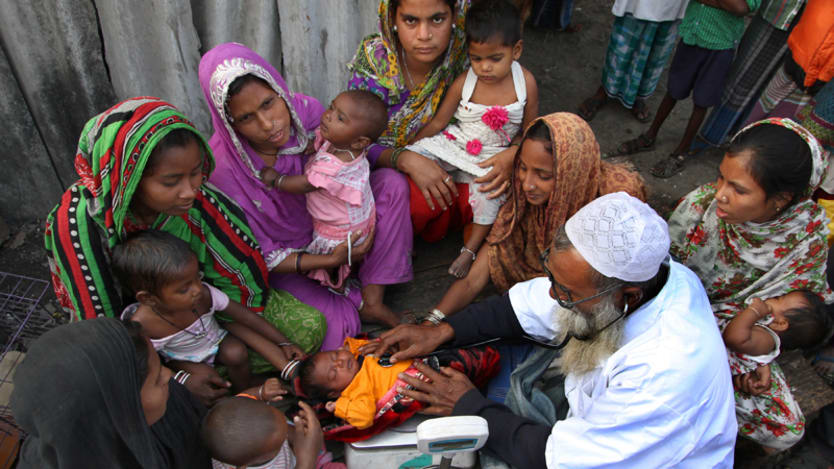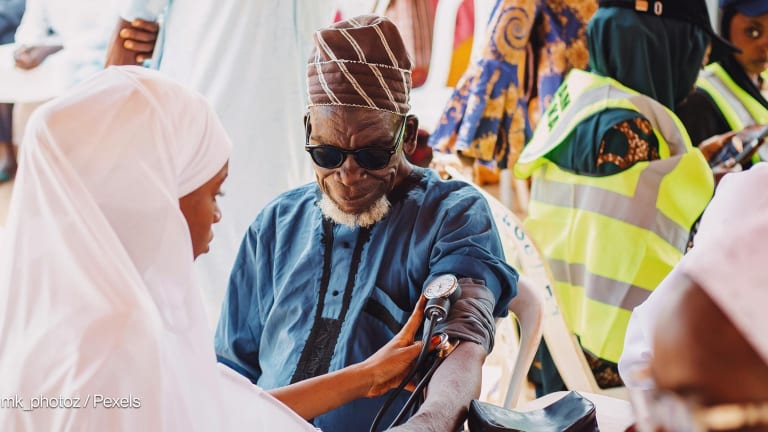
Diabetes is one of the most common complications pregnant women face globally, affecting 1 in 7 births and 10-25 percent of pregnancies. However, many governments and health authorities have not yet made the prevention, screening, and treatment of diabetes a public health priority.
The United Nations High-level Meeting on NCDs — taking place during the U.N. General Assembly — offers a chance to change that. As top decision-makers from across the world strategize on how to build healthier communities and prevent the spread of noncommunicable diseases, they must seize the moment and commit to action — to build bridges across communities, forge partnerships across sectors, and deliberately address women’s health, including diabetes in pregnancy.
In 2015, the global community agreed on the Sustainable Development Goals, which outline priority areas for international development. Governments committed to safeguarding the health and well-being of all people, including women and newborns. But today there are still more than 300,000 women dying in pregnancy each year. More than 200 million women are living with diabetes globally, and this number will increase to 308 million by 2045 unless we adopt strategies and policies that recognize the impacts of NCDs on women and newborn health. To honor the SDG commitments, cross-cutting solutions are needed that get at the heart of preventable maternal, newborn, and child deaths and take a holistic approach to health that considers the unique needs for an individual throughout their lifetime.
Addressing diabetes in pregnancy is a good place to start
To this end, Women Deliver, the World Diabetes Foundation, and the NCD Alliance — along with many other partners — have been convening maternal, newborn, child health, and NCD stakeholders to break down silos, accelerate integration, and tackle diabetes in pregnancy. This cross-cutting conversation has permeated global forums, including the FIGO World Congress in 2015, the 2017 and 2018 World Health Assembly, and The Global Strategy for Women’s, Children’s, and Adolescents’ Health. This is progress, but it is simply not enough.
“If the global community increases investment in prevention, screening, and treatment, we can reduce the rate at which women develop diabetes in pregnancy. This, in turn, can mitigate health complications for both woman and child — and help save lives.”
—To mobilize transformative change, we want to bring women’s health and diabetes in pregnancy to the high-level meeting’s agenda. We launched a call to action asking governments for commitment and action, outlining the steps they must take in order to save lives, improve maternal health, and curb intergenerational transmission of NCDs.
So far, the call has received the support of nearly 100 organizations worldwide from across civil society, advocacy groups, academia, medical institutions, and the private sector. However, this is only the beginning. We must grow this effort and turn its energy into concrete action — globally, nationally, and in the communities where women live and die.
Diabetes in pregnancy is a serious and growing issue in all regions of the world and at all income levels. More than half of the global diabetes epidemic is shouldered by just eight low- and middle-income countries: India, China, Nigeria, Pakistan, Indonesia, Bangladesh, Brazil, and Mexico. These same countries account for more than half of global live births and two-thirds of maternal and newborn deaths and disabilities.
Six steps toward commitment and action on diabetes in pregnancy
1. Start from the top
Commit to addressing diabetes in pregnancy in a national-level NCD action plan, and encourage sub-national and local leaders to issue similar political commitments.
2. Prioritize and scale up
Integrate diabetes in pregnancy into countrywide NCD assessments and use the data to identify priority areas for national and sub-national action.
3. Embed and expand
Leverage existing health service delivery platforms, such as routine maternal health services and child immunization programs, to screen for and treat diabetes in pregnancy.
4. Collaborate
Promote a policy environment that encourages work across sectors to advance integrated service delivery that includes maternal health and NCD prevention and treatment.
5. Finance
Dedicate domestic health funding to diagnose, prevent, and treat diabetes in pregnancy, and encourage existing global financing mechanisms to incorporate diabetes in pregnancy into their work and outcomes.
6. Act for accountability
Integrate diabetes in pregnancy into national and local accountability mechanisms for overall health, and in particular, NCDs and maternal and child health.
When left untreated, diabetes increases the risk of complications during pregnancy for both woman and child, including hemorrhage, hypertension, obstructed labor, and infection. A woman who experiences diabetes during pregnancy is more likely to develop type 2 diabetes after the birth. Her child runs a higher risk of developing obesity and diabetes, and at an earlier age than children born to healthy mothers, creating a significant public health challenge for current and future generations.
If the global community increases investment in prevention, screening, and treatment, we can reduce the rate at which women develop diabetes in pregnancy. This, in turn, can mitigate health complications for both woman and child — and help save lives.
Take the example of Nayani Nimeshik, a 21-year-old mother from Sri Lanka. With no family history of diabetes, Nimeshik did not think she or her child were at risk. But Nimeshik received a blood glucose test three months into her pregnancy, thanks to a partnership between Sri Lanka’s Diabetes Prevention Task Force and the World Diabetes Foundation. When the results came back positive, she and her providers crafted a nutrition, exercise, and insulin plan to treat her diabetes. Nimeshik went on to have a safe birth and deliver a healthy baby girl.
This story and many others like it reaffirm that pregnancy is a critical window to screen and treat diabetes, as well as our best chance to interrupt the intergenerational cycle of NCDs. Increased attention to the links between NCDs, such as diabetes, and women’s and children’s health is vital to achieving health and well-being for all. Offering NCD and maternal health services together can help more women receive screenings and treatment, especially in low-resource, high-burden settings, and move us toward achieving the SDGs.
Our call to action will help drive tangible results that will ultimately save lives and improve the health of women and future generations. But its mission can only succeed with strong backing by civil society organizations, medical professionals, U.N. agencies, academia, the private sector, and others ready to take a stand. We encourage partner organizations to add their voices here and join us in urging governments to heed the call.









